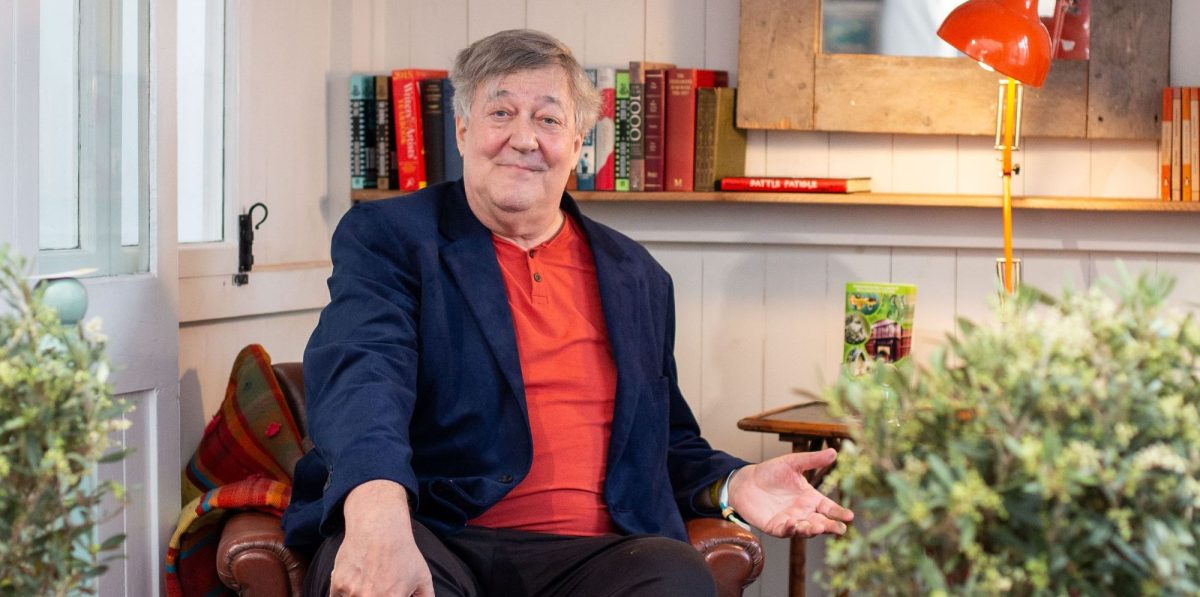When asked why art matters, why it’s important, the English author, actor, television presenter, comedian and polymath Stephen Fry agrees with this writer’s suggestion that art is something numinous, something that transcends the everyday.
“Transcendent is a marvellous word to use. [Art] does take us out of the humdrum and so on. But I’d also say it does the opposite. It actually makes us penetrate reality in a more extraordinary way than anything else can,” says Fry, speaking from his Melbourne hotel room on the eve of a national tour of Australia and Aotearoa New Zealand.
“It’s a paradox of poetry and art and so on, that if you talk to an artist they’re not interested in big ideas, they’re interested in the detail of things – the good old Anglo Saxon word ‘whatness’, the whatness of things. The fingernailness of a fingernail, the skinness of skin, the woodiness of wood.
“The very essence of a thing, the absolute truth of it, is something so hard to capture, and art is the only way to do it, because a photograph doesn’t in any way get you the emotional reality of what a thing is,” he explains.
Fry’s extraordinary career to date includes writing and performing in television comedies such as A Bit of Fry and Laurie alongside screen partner Hugh Laurie, a long-running stint hosting the quirky TV quiz show QI, and writing and presenting the Emmy Award-winning documentary Stephen Fry: The Secret Life of the Manic Depressive (which explored his personal experiences of living with bipolar disorder) and another television documentary, Stephen Fry: Out There (which saw Fry, who married his husband Elliott Spencer in 2015, discussing homophobia with anti-gay politicians and a practitioner of so-called ‘gay conversion therapy’).
He has also hosted podcasts and narrated audio books, appeared in numerous stage and screen roles ranging from the comedy series Blackadder and Peter Jackson’s Hobbit trilogy to the long-running science fiction series Doctor Who, and written numerous books himself, including novels, memoirs and several recent retellings of ancient Greek myths: Mythos, Heroes, Troy and Odyssey, the latter of which was published in September this year.
Referencing his childhood idol Oscar Wilde (who Fry memorably played in Brian Gilbert’s 1997 film Wilde, for which he was nominated for the Golden Globe Award for Best Actor in a Drama), the English wit and raconteur says: “Oscar Wilde said all art is useless, which surprises a lot of people, because they think, ‘No, but art is what you need, and surely Oscar was the aesthete of all aesthetes, he valued art!’ And yes, he did, but it’s useless. It’s not to be confused with things that have function and meaning.”
Read: Music review: The Sound of Philadelphia, Royal Albert Hall
Art, Fry continues, “is like wine or love. You can say that drink is essential to be human. You need to drink or you die. You need to recreate, or the species dies. But you don’t need wine and love. They are somehow these extraordinary extras that are nothing to do with reproduction as such, or with surviving through liquid hydration. They are this manifestly extraordinary, complex, terrifying, dangerous and wonderful extras that life offers you – and that is the liminal territory of art as well.
“It’s where things are quite useless, like wine, but the paradox is, you couldn’t live without them … useless, but utterly necessary.”
Fry is visiting Australia to present An Evening with Stephen Fry, a series of solo performances beginning in Perth, in which he will discourse on whatever subject takes his fancy each night.
When asked how he structures such performances – which for An Evening with Stephen Fry include an interactive element allowing audiences members to ask their own questions – Fry replies, “I suppose, in the manner of an evangelist preacher, I have to hope the spirit moves me, but it usually does. I have things I can fall back on if I find that I’m not immensely inspired, but I usually am.
“I suppose I was the kind of boy at school who was told he was too fond of the sound of his own voice, and they usually assume that such people are destined for failure, disaster, crime and so forth. But there is just that small number of us who managed to get a career out of just talking a lot, or having a lot to say, or wanting to communicate.
“I am an entertainer in that I like to make people smile. I like to make people think. I like to give pleasure where I can. But having a small box of tricks – no tap dancing, very limited conjuring – I rely on the voice and the wits and the hope that people will be interested in what I have to say and share with them. And, so far, it seems to it seems to have worked.”
Fry adds, chuckling, “I’m not a very good self-advertiser, am I? I should come up with [something] better than that. I am brilliant. It’s astonishing how I hold people in the palm of my hand, and I only have to breathe for them to frot their thighs together with joy.”
Stephen Fry is touring Australia from 27 October to 9 November, followed by additional performances in Aotearoa New Zealand. Learn more about An Evening with Stephen Fry.
This article is based on a conversation between Stephen Fry and Richard Watts conducted on Watts’ weekly radio program SmartArts on Melbourne’s 3RRR FM. Listen back to the interview in full.




